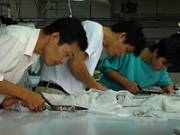|
|
||||
|
|
by Donald Levit  Earlier films of Jia Zhang-ke are available in his homeland only on pirated DVDs. Glacially paced and lacking causal progression, they and the works since intrigue at the same time that they bore, and Useless/Inutile is cut from the same cloth. The frequent New York Film Festival invitee accompanied his movie, and, through a translator, indicated this is the second, after East/Dong, in a projected triptych on the endangered status of artists in industrial superpower In the rampant adapted capitalism and hence consumerism of the country since the late 1980s, non-commercial creators and intellectuals are threatened with marginalization and loss of public presence. So, another fly in Philosopher William James listed clothes first among the possessions that define man’s Self, Mark Twain remarked that they actually do “make the man. Naked people have little or no influence in society,” while avant-garde designer Ma Ke’s “philosophy parallels [my own] in the arts as checks and balances against the commercially useful.” Indeed, the title itself is direct translation of “Wu Yong,” the line put out by that young designer against fashion, a rebel against both highfalutin name designer shops (pictured briefly) and cheaper ware mass-produced without soul by, for example, the Guangzhou née Canton 5th Industrial Zone assembly line which occupies the documentary’s first third. At such latter factories, workers eat cheerless meals in water-spattered cafeterias beside a bare company health clinic treating eye inflammations, digestive upsets, and stress with equal cursoriness. Movies like his “can find a house audience but by His films, that is, develop not so much chronologically or causally, as by an inner logic that one either accepts or not. “My narratives [i.e., fictions] seem like documentaries to me, and some of my documentaries seem like narrative films.” Thus, the factory scenes appear to devolve from the stupendous tracking shot that initiates Jennifer Baichwal’s Manufactured Landscapes, but the true unity lies in the produced, as distinct from patched up, clothing and the factory workers’ country origins in the final third’s depressed Shanxi Province (Jia’s birthplace and the setting for earlier fictions like Platform). “Trying to get at the truth in what may seem to be narrative elements,” the filmmaker denied any scripting, such as in the hesitant words of a tailor-turned-miner and his shy wife, where the camera only closes in for “mutual understanding at a comfortable distance [when] the subject becomes more accepting and forgets I’m there.” Concerned, too, with distance, in this case the growing gap separating manufacturer from customer, Ma is accompanied by her dogs, caught in the rural studio to which she transferred her operation and where her clothing is hand-loomed then buried in earth to allow for organic-forces finishing. Soon she is in couture capital Relief and contrast are furnished in a couple frames of the bored blue-jeaned models waiting to be dressed, and a small spot of humor in the older redheaded one who motherhens them and remarks on the unbearable heaviness of bearing Wu Yong creations. A final contrast to factory rows and Jia’s works comment on the old (Released by Xstream Pictures; not rated by MPAA.) |
||
|
© 2026 - ReelTalk Movie Reviews Website designed by Dot Pitch Studios, LLC |



